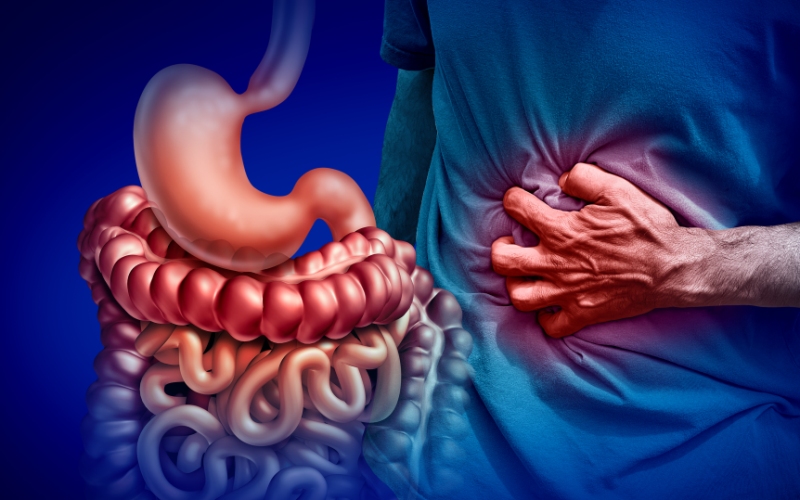The human gut is often referred to as the body’s second brain—and for good reason. It is home to trillions of microorganisms, collectively known as the gut microbiota, that play an essential role in digestion, immune defense, and overall well-being. However, when the balance of this microbial community is disrupted, it can lead to a cascade of health problems, including leaky gut syndrome and poor digestion.
At Local MD, we understand how gut health influences nearly every aspect of your body. In this article, we explore the intricate connection between gut bacteria imbalance, intestinal permeability, and digestive disorders, and share how you can restore balance for optimal health.
Understanding the Gut Microbiome
Your gut microbiome consists of bacteria, fungi, viruses, and other microorganisms living in your digestive tract. A healthy gut microbiome maintains a delicate balance between beneficial and harmful microbes, ensuring smooth digestion, proper nutrient absorption, and immune system regulation.
When the microbiome is balanced, beneficial bacteria help:
-
Break down complex carbohydrates and fibers into short-chain fatty acids (SCFAs) like butyrate, which nourish intestinal cells.
-
Protect against pathogens by competing for nutrients and space.
-
Regulate inflammation and strengthen the gut barrier.
However, poor diet, stress, antibiotics, infections, or environmental toxins can disrupt this equilibrium—a condition known as dysbiosis. Once dysbiosis sets in, harmful bacteria begin to thrive, weakening the intestinal lining and triggering leaky gut syndrome.
What Is Gut Bacteria Imbalance (Dysbiosis)?
Dysbiosis occurs when the ratio of good to bad bacteria becomes skewed. Instead of a diverse, harmonious ecosystem, the gut becomes overpopulated with pathogenic bacteria, yeast, or fungi.
Common Causes of Dysbiosis
-
High Sugar and Processed Food Intake – Diets rich in refined carbohydrates and artificial additives feed harmful bacteria and yeast, such as Candida allicins.
-
Overuse of Antibiotics – While antibiotics kill infections, they also wipe out beneficial microbes, leaving the gut vulnerable.
-
Chronic Stress – Stress hormones like cortisol alter gut motility and reduce the production of stomach acid, leading to microbial imbalance.
-
Poor Sleep and Sedentary Lifestyle – Lack of physical activity slows digestion and reduces microbial diversity.
-
Environmental Toxins – Exposure to pesticides, heavy metals, and pollutants damages the gut flora and intestinal lining.
How Gut Imbalance Leads to Leaky Gut
Leaky Gut Syndrome, medically known as increased intestinal permeability, occurs when the tight junctions in the intestinal wall become compromised. These junctions act as gatekeepers, controlling what passes from the gut into the bloodstream.
When harmful bacteria dominate, they produce toxins and inflammatory molecules that damage the intestinal lining. The once-tight barriers loosen, allowing undigested food particles, bacteria, and toxins to “leak” into the bloodstream.
This triggers an immune response, causing chronic inflammation and a wide range of symptoms, including:
-
Bloating and gas
-
Food sensitivities
-
Fatigue
-
Skin issues like eczema or acne
-
Autoimmune flare-ups
Over time, leaky gut can contribute to systemic inflammation, autoimmune diseases, and digestive disorders such as Irritable Bowel Syndrome (IBS), Crohn’s disease, and ulcerative colitis.
The Gut–Brain Connection
The gut and brain communicate through the gut-brain axis, a two-way communication system involving nerves, hormones, and immune signaling.
An imbalance in gut bacteria affects this connection in several ways:
-
Neurotransmitter Production: Certain gut bacteria help produce serotonin and dopamine—chemicals responsible for mood regulation. Dysbiosis can lead to anxiety, depression, and brain fog.
-
Inflammatory Signals: Inflammatory compounds from leaky gut can travel through the bloodstream, cross the blood-brain barrier, and impact cognitive function.
-
Vagus Nerve Dysfunction: The vagus nerve transmits information between the gut and brain. Chronic inflammation can interfere with this pathway, worsening mental and digestive health.
Thus, a disturbed gut microbiome doesn’t just affect digestion—it impacts your mental clarity, emotional stability, and stress resilience.
Symptoms of Gut Bacteria Imbalance
The signs of gut imbalance can manifest both inside and outside the digestive system. Common symptoms include:
-
Chronic bloating and gas
-
Irregular bowel movements (constipation or diarrhea)
-
Abdominal pain or cramping
-
Food intolerances or sensitivities
-
Frequent fatigue or sluggishness
-
Sugar cravings
-
Unexplained skin breakouts
-
Frequent infections or weakened immunity
If these symptoms persist, it may be time to assess your gut health through microbiome testing or stool analysis offered by medical professionals at Local MD.
How Gut Imbalance Disrupts Digestion
When good bacteria decline, digestion becomes inefficient. Here’s how dysbiosis affects the digestive process:
Poor Nutrient Absorption
Beneficial bacteria help digest complex nutrients and synthesize essential vitamins like B12, K2, and folate. Without them, your body struggles to absorb nutrients, leading to deficiencies and fatigue.
Excessive Gas and Bloating
Overgrowth of harmful bacteria results in fermentation of undigested food, producing excess gas, bloating, and abdominal discomfort.
Irregular Bowel Movements
Imbalanced flora disrupts stool consistency and frequency, leading to constipation, diarrhea, or alternating patterns, as seen in IBS.
Weakened Digestive Enzymes
Dysbiosis can reduce enzyme production, making it harder to digest proteins and fats. This contributes to acid reflux, nausea, and indigestion.
Long-Term Health Effects of Leaky Gut and Dysbiosis
Left untreated, chronic gut imbalance can contribute to numerous health conditions beyond digestion, including:
-
Autoimmune diseases (such as rheumatoid arthritis or Hashimoto’s thyroiditis)
-
Chronic fatigue syndrome
-
Metabolic disorders and obesity
-
Allergies and asthma
-
Mood disorders such as depression and anxiety
-
Skin conditions like psoriasis and rosacea
The gut’s health is deeply intertwined with immune regulation, hormonal balance, and systemic inflammation, making its maintenance vital to long-term wellness.
Steps to Restore Gut Health
Restoring gut balance requires a combination of dietary changes, lifestyle modifications, and medical guidance. At Local MD, we recommend a personalized plan tailored to each individual’s needs.
Adopt a Gut-Healing Diet
Focus on whole, nutrient-dense foods that nourish beneficial bacteria and repair the intestinal lining:
-
High-fiber vegetables (broccoli, spinach, asparagus)
-
Fermented foods (yogurt, kefir, sauerkraut, kimchi)
-
Bone broth for collagen and amino acids that repair the gut lining
-
Healthy fats (avocado, olive oil, nuts, seeds)
-
Prebiotic-rich foods like garlic, onions, and bananas
Avoid:
-
Processed foods and refined sugars
-
Artificial sweeteners (which alter gut bacteria)
-
Alcohol and caffeine excess
-
Gluten and dairy (if sensitive)
Use Probiotics and Prebiotics
Probiotics introduce beneficial bacteria into the gut, while prebiotics feed them. Together, they help restore microbial diversity. Supplements or fermented foods can help rebuild balance.
Manage Stress
Chronic stress weakens the gut barrier and alters microbiota composition. Incorporate mindfulness, yoga, deep breathing, or meditation into your daily routine.
Prioritize Sleep and Movement
A consistent sleep schedule and regular exercise enhance gut motility and microbial diversity. Aim for 7–8 hours of quality sleep and 30 minutes of movement daily.
Limit Antibiotic Use
Only use antibiotics when prescribed and necessary. When taking them, follow up with a probiotic regimen to replenish beneficial bacteria.
Work With a Functional Medicine Provider
At Local MD, our specialists evaluate your gut health through advanced testing and create customized nutrition, supplementation, and lifestyle plans to heal your gut from the inside out.
The Path to Better Digestion and Overall Health
A healthy gut is the foundation of a healthy body. When your microbiome is balanced, digestion improves, energy levels stabilize, inflammation decreases, and mental clarity returns.
By restoring harmony to your gut bacteria, you can:
-
Enhance nutrient absorption
-
Strengthen immunity
-
Improve mood and cognitive function
-
Reduce food sensitivities
-
Enjoy smoother digestion and greater vitality
Conclusion
The connection between gut bacteria imbalance, leaky gut, and poor digestion is undeniable. Modern lifestyles filled with processed foods, chronic stress, and environmental toxins have made gut health more fragile than ever. But with proper care, awareness, and medical guidance, it is entirely possible to restore balance and reclaim optimal digestive health.
At Local MD, we are dedicated to helping patients uncover the root causes of their digestive issues and heal naturally through science-backed, compassionate care.






